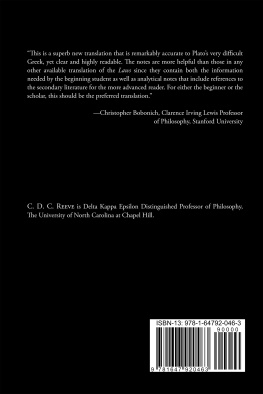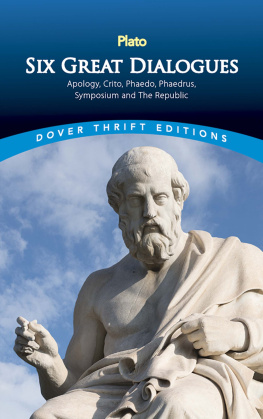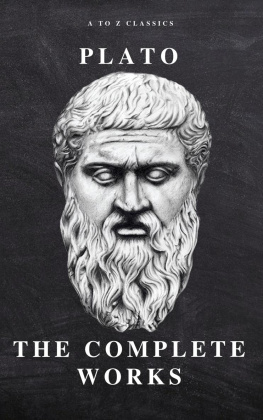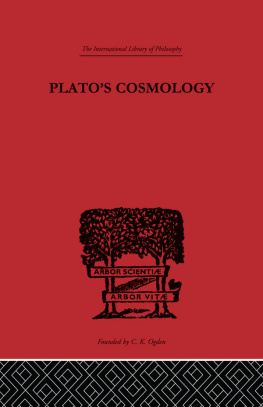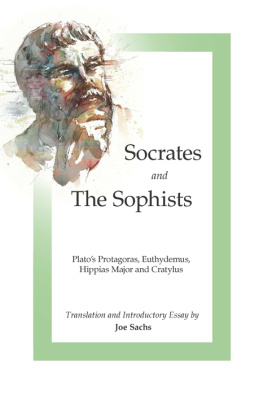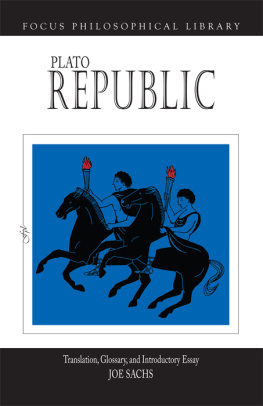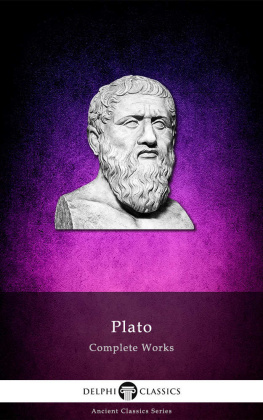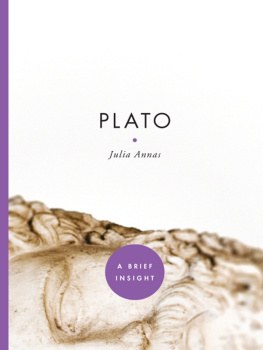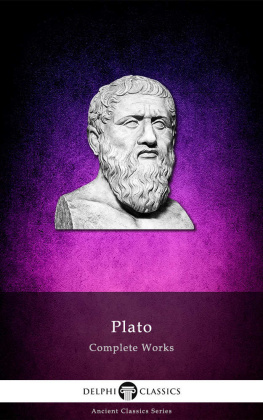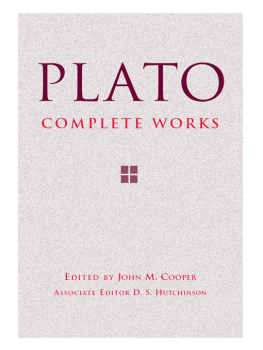Plato - Lesser Hippias
Here you can read online Plato - Lesser Hippias full text of the book (entire story) in english for free. Download pdf and epub, get meaning, cover and reviews about this ebook. genre: Science. Description of the work, (preface) as well as reviews are available. Best literature library LitArk.com created for fans of good reading and offers a wide selection of genres:
Romance novel
Science fiction
Adventure
Detective
Science
History
Home and family
Prose
Art
Politics
Computer
Non-fiction
Religion
Business
Children
Humor
Choose a favorite category and find really read worthwhile books. Enjoy immersion in the world of imagination, feel the emotions of the characters or learn something new for yourself, make an fascinating discovery.
Lesser Hippias: summary, description and annotation
We offer to read an annotation, description, summary or preface (depends on what the author of the book "Lesser Hippias" wrote himself). If you haven't found the necessary information about the book — write in the comments, we will try to find it.
Lesser Hippias — read online for free the complete book (whole text) full work
Below is the text of the book, divided by pages. System saving the place of the last page read, allows you to conveniently read the book "Lesser Hippias" online for free, without having to search again every time where you left off. Put a bookmark, and you can go to the page where you finished reading at any time.
Font size:
Interval:
Bookmark:
The Project Gutenberg EBook of Lesser Hippias, by Plato
This eBook is for the use of anyone anywhere at no cost and with
almost no restrictions whatsoever. You may copy it, give it away or
re-use it under the terms of the Project Gutenberg License included
with this eBook or online at www.gutenberg.org
Title: Lesser Hippias
Author: Plato
Translator: Benjamin Jowett
Release Date: October 15, 2008 [EBook #1673]
Language: English
*** START OF THIS PROJECT GUTENBERG EBOOK LESSER HIPPIAS ***
Produced by Sue Asscher, and David Widger
APPENDIX I. LESSER HIPPIAS INTRODUCTION. |
It seems impossible to separate by any exact line the genuine writings of Plato from the spurious. The only external evidence to them which is of much value is that of Aristotle; for the Alexandrian catalogues of a century later include manifest forgeries. Even the value of the Aristotelian authority is a good deal impaired by the uncertainty concerning the date and authorship of the writings which are ascribed to him. And several of the citations of Aristotle omit the name of Plato, and some of them omit the name of the dialogue from which they are taken. Prior, however, to the enquiry about the writings of a particular author, general considerations which equally affect all evidence to the genuineness of ancient writings are the following: Shorter works are more likely to have been forged, or to have received an erroneous designation, than longer ones; and some kinds of composition, such as epistles or panegyrical orations, are more liable to suspicion than others; those, again, which have a taste of sophistry in them, or the ring of a later age, or the slighter character of a rhetorical exercise, or in which a motive or some affinity to spurious writings can be detected, or which seem to have originated in a name or statement really occurring in some classical author, are also of doubtful credit; while there is no instance of any ancient writing proved to be a forgery, which combines excellence with length. A really great and original writer would have no object in fathering his works on Plato; and to the forger or imitator, the 'literary hack' of Alexandria and Athens, the Gods did not grant originality or genius. Further, in attempting to balance the evidence for and against a Platonic dialogue, we must not forget that the form of the Platonic writing was common to several of his contemporaries. Aeschines, Euclid, Phaedo, Antisthenes, and in the next generation Aristotle, are all said to have composed dialogues; and mistakes of names are very likely to have occurred. Greek literature in the third century before Christ was almost as voluminous as our own, and without the safeguards of regular publication, or printing, or binding, or even of distinct titles. An unknown writing was naturally attributed to a known writer whose works bore the same character; and the name once appended easily obtained authority. A tendency may also be observed to blend the works and opinions of the master with those of his scholars. To a later Platonist, the difference between Plato and his imitators was not so perceptible as to ourselves. The Memorabilia of Xenophon and the Dialogues of Plato are but a part of a considerable Socratic literature which has passed away. And we must consider how we should regard the question of the genuineness of a particular writing, if this lost literature had been preserved to us.
These considerations lead us to adopt the following criteria of genuineness: (1) That is most certainly Plato's which Aristotle attributes to him by name, which (2) is of considerable length, of (3) great excellence, and also (4) in harmony with the general spirit of the Platonic writings. But the testimony of Aristotle cannot always be distinguished from that of a later age (see above); and has various degrees of importance. Those writings which he cites without mentioning Plato, under their own names, e.g. the Hippias, the Funeral Oration, the Phaedo, etc., have an inferior degree of evidence in their favour. They may have been supposed by him to be the writings of another, although in the case of really great works, e.g. the Phaedo, this is not credible; those again which are quoted but not named, are still more defective in their external credentials. There may be also a possibility that Aristotle was mistaken, or may have confused the master and his scholars in the case of a short writing; but this is inconceivable about a more important work, e.g. the Laws, especially when we remember that he was living at Athens, and a frequenter of the groves of the Academy, during the last twenty years of Plato's life. Nor must we forget that in all his numerous citations from the Platonic writings he never attributes any passage found in the extant dialogues to any one but Plato. And lastly, we may remark that one or two great writings, such as the Parmenides and the Politicus, which are wholly devoid of Aristotelian (1) credentials may be fairly attributed to Plato, on the ground of (2) length, (3) excellence, and (4) accordance with the general spirit of his writings. Indeed the greater part of the evidence for the genuineness of ancient Greek authors may be summed up under two heads only: (1) excellence; and (2) uniformity of traditiona kind of evidence, which though in many cases sufficient, is of inferior value.
Proceeding upon these principles we appear to arrive at the conclusion that nineteen-twentieths of all the writings which have ever been ascribed to Plato, are undoubtedly genuine. There is another portion of them, including the Epistles, the Epinomis, the dialogues rejected by the ancients themselves, namely, the Axiochus, De justo, De virtute, Demodocus, Sisyphus, Eryxias, which on grounds, both of internal and external evidence, we are able with equal certainty to reject. But there still remains a small portion of which we are unable to affirm either that they are genuine or spurious. They may have been written in youth, or possibly like the works of some painters, may be partly or wholly the compositions of pupils; or they may have been the writings of some contemporary transferred by accident to the more celebrated name of Plato, or of some Platonist in the next generation who aspired to imitate his master. Not that on grounds either of language or philosophy we should lightly reject them. Some difference of style, or inferiority of execution, or inconsistency of thought, can hardly be considered decisive of their spurious character. For who always does justice to himself, or who writes with equal care at all times? Certainly not Plato, who exhibits the greatest differences in dramatic power, in the formation of sentences, and in the use of words, if his earlier writings are compared with his later ones, say the Protagoras or Phaedrus with the Laws. Or who can be expected to think in the same manner during a period of authorship extending over above fifty years, in an age of great intellectual activity, as well as of political and literary transition? Certainly not Plato, whose earlier writings are separated from his later ones by as wide an interval of philosophical speculation as that which separates his later writings from Aristotle.
The dialogues which have been translated in the first Appendix, and which appear to have the next claim to genuineness among the Platonic writings, are the Lesser Hippias, the Menexenus or Funeral Oration, the First Alcibiades. Of these, the Lesser Hippias and the Funeral Oration are cited by Aristotle; the first in the Metaphysics, the latter in the Rhetoric. Neither of them are expressly attributed to Plato, but in his citation of both of them he seems to be referring to passages in the extant dialogues. From the mention of 'Hippias' in the singular by Aristotle, we may perhaps infer that he was unacquainted with a second dialogue bearing the same name. Moreover, the mere existence of a Greater and Lesser Hippias, and of a First and Second Alcibiades, does to a certain extent throw a doubt upon both of them. Though a very clever and ingenious work, the Lesser Hippias does not appear to contain anything beyond the power of an imitator, who was also a careful student of the earlier Platonic writings, to invent. The motive or leading thought of the dialogue may be detected in Xen. Mem., and there is no similar instance of a 'motive' which is taken from Xenophon in an undoubted dialogue of Plato. On the other hand, the upholders of the genuineness of the dialogue will find in the Hippias a true Socratic spirit; they will compare the Ion as being akin both in subject and treatment; they will urge the authority of Aristotle; and they will detect in the treatment of the Sophist, in the satirical reasoning upon Homer, in the reductio ad absurdum of the doctrine that vice is ignorance, traces of a Platonic authorship. In reference to the last point we are doubtful, as in some of the other dialogues, whether the author is asserting or overthrowing the paradox of Socrates, or merely following the argument 'whither the wind blows.' That no conclusion is arrived at is also in accordance with the character of the earlier dialogues. The resemblances or imitations of the Gorgias, Protagoras, and Euthydemus, which have been observed in the Hippias, cannot with certainty be adduced on either side of the argument. On the whole, more may be said in favour of the genuineness of the Hippias than against it.
Font size:
Interval:
Bookmark:
Similar books «Lesser Hippias»
Look at similar books to Lesser Hippias. We have selected literature similar in name and meaning in the hope of providing readers with more options to find new, interesting, not yet read works.
Discussion, reviews of the book Lesser Hippias and just readers' own opinions. Leave your comments, write what you think about the work, its meaning or the main characters. Specify what exactly you liked and what you didn't like, and why you think so.


